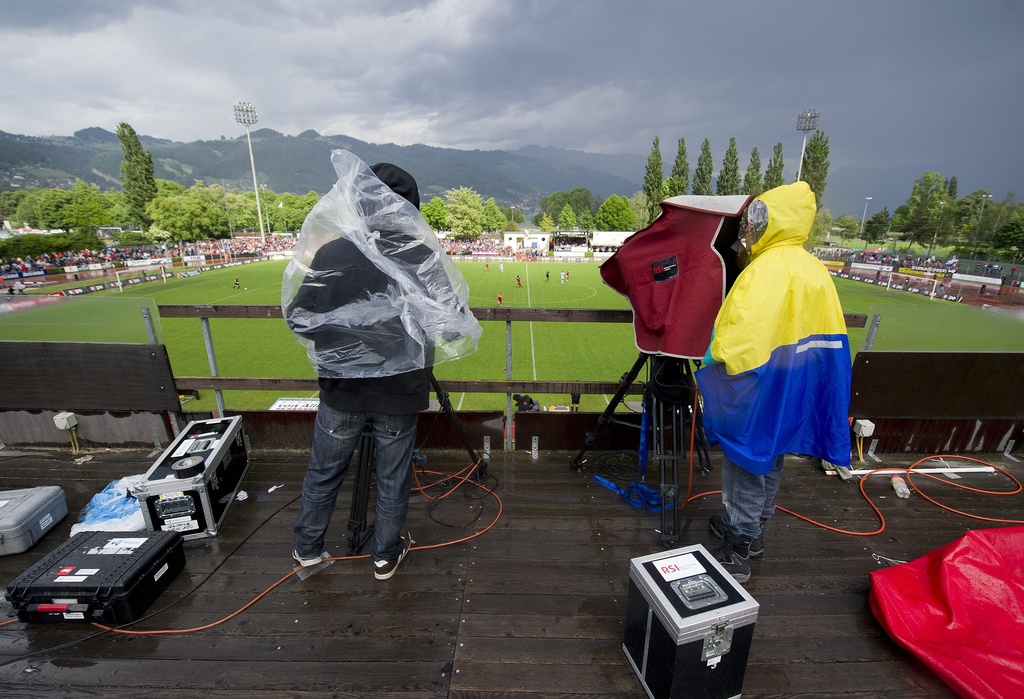
Swiss public opinion “keeps tabloids in line”

The phone hacking scandal in Britain is prompting closer scrutiny of the relationship between the media and politics, and of privacy breaches, the world over.
In Switzerland, where media houses Tamedia and Ringier own the lion’s share of the country’s press titles, there is general consensus that politics and the media must operate on separate playing fields.
In an interview with swissinfo.ch, Peter Studer, a former editor of the Zurich daily Tages-Anzeiger and of Swiss public television station SF, says that although tabloids such as Ringier’s Blick certainly wield influence, the Swiss public remains less accepting of gross intrusions into the private lives of public figures.
Studer was president of the Swiss Press Council between 2001 and 2007.
swissinfo.ch: Could something like Britain’s hacking scandal happen in Switzerland?
Peter Studer: In this form it couldn’t because it is forbidden by the penal code. I understand from the big companies in the telecoms sector that this kind of phone hacking is prevented by safety measures in Switzerland. It seems to have been very, very easy in Britain.
swissinfo.ch: The tabloid media in Britain has huge influence on society and politics, does the Swiss tabloid media wield a similar influence?
P.S.: They have a considerable influence because Blick and SonntagsBlick are the two major publications in terms of readership. They wield a certain influence but not the same amount of influence as in Britain. In Britain, there has been a huge tabloid sector in the media since mid-19th century; in Switzerland the first tabloid appeared in 1959.
Secondly, they are not as hell-bent on intruding into other people’s lives as the British tabloid press. It is just a fact that they don’t go as far, although intrusions into private lives occur – and often are discussed in court.
swissinfo.ch: What about the Swiss public and their acceptance of tabloid reporting of the celebrity culture?
P.S.: There have been cases when the Swiss public started to frown on extreme intrusions into other people’s lives. There was a case nine years ago when a very popular Swiss ambassador in Berlin was the object of very aggressive intrusion by Blick and SonntagsBlick – not only all the other papers rebelled, but also a lot of subscribers and advertisers complained. Blick had to apologise on its front page.
I think there is a certain barrier in public opinion against very extreme cases. However, the Swiss Press Council has published a number of reprimands.
swissinfo.ch: Does the Swiss Press Council have binding sanctions that it can impose in cases of privacy breaches?
P.S.: No. The only thing it can do is it immediately publishes its findings, naming the people involved. I think the findings are quite well read, especially in the media world. The council is not yet fully successful in having the culprits publish the findings. The discipline in this point is a bit lacking especially by the first offenders.
swissinfo.ch: Do you know of cases as in Britain of journalists using detectives or paying for information in Switzerland?
P.S.: I think the dimension is very particular to Britain but there have been individual cases in Switzerland. Recently there were two brothers who were taxi drivers accused of raping passengers and Blick then said that the story was confirmed, and this was not true. In this case, it turned out that a policeman had been misled into giving the [inaccurate] information to the reporter. It was not the same type as with the Murdoch papers.
swissinfo.ch: To what extent do media owners in Switzerland exert influence over the political class and debate?
P.S.: There are attempts to influence politicians, especially when the interests of media houses are involved in terms of control of advertising, but such influence as we have now found out existed in Britain, I think is not possible here.
We have two major media houses… but they would never go as far as Murdoch has in Britain in fully supporting or even promoting one political party. I think it would immediately become an issue in public debate and all the media would go down on the one who goes that far. I think the culture is simply different here.
swissinfo.ch: What lessons should Swiss media take from what is happening in Britain?
P.S.: Everybody in the media learns that one has to be very careful and that the mutual influence between politicians and media people has to be strongly conditioned and reluctant. Basically there is the conviction that politics and media have to be separate.
I think there is general agreement that one shouldn’t now just impose a number of new laws that control the press because that could damage healthy opposition.
In Switzerland the electronic media are regulated up to a degree and have political guidelines on impartiality and so on. But the press is not regulated at all in these matters and I think this will stay that way. There is a code of ethics supervised by the Press Council and there is quite a lot of interest in how we are going to build on the past to promote it further.
2005: British police launch inquiry into news gathering practices at News International tabloid News of the World following complaints that the phones of royal staffers may have been hacked.
2007: NoW royal editor Clive Goodman, and private investigator Glenn Mulcaire, hired by the paper, are jailed for conspiring to access phone messages. NoW editor Andy Coulson, later appointed by Prime Minister David Cameron as communications chief, resigns. News International maintains the practice is limited to one “rogue reporter”.
2009: The Guardian newspaper claims widespread hacking by journalists at NoW targeted more than 3,000 people.
2010: Parliamentary committee accuses NoW executives of “collective amnesia” over the practice of phone hacking at the paper.
An investigation by Scotland Yard later in the year finds no evidence of criminal activity.
Series of revelations in the first months of 2011 add weight to speculation that phone hacking at NoW was systematically used as a source of information.
Second NoW journalist arrested on suspicion of unlawfully intercepting communications. News International establishes compensation scheme to settle growing number of claims of hacking.
The Guardian reports that NoW hacked into voicemail box and deleted messages left for missing schoolgirl Milly Dowler.
Amid the growing uproar, News International chairman James Murdoch announces closure of NoW after 168 years in print.
Subsequent claims of hacking of phones of families of war dead and police bribes lead to resignations of senior News executives in Britain and the United States, as well as the commissioner and deputy commissioner of Scotland Yard.
Prime Minister David Cameron comes under increasing pressure over his close ties with News International executives.
Former NoW editors Andy Coulson and Rebekah Brooks arrested by police.
Rupert and James Murdoch appear on July 19 before parliamentary commission to answer questions about what they knew and when about phone hacking at NoW.

In compliance with the JTI standards
More: SWI swissinfo.ch certified by the Journalism Trust Initiative






































You can find an overview of ongoing debates with our journalists here . Please join us!
If you want to start a conversation about a topic raised in this article or want to report factual errors, email us at english@swissinfo.ch.